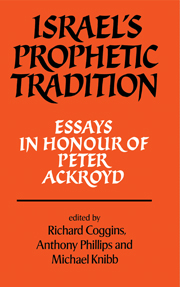Book contents
- Frontmatter
- Contents
- Preface
- Biographical note
- Abbreviations
- Note
- Prophecy in the ancient Near East
- The origins of prophecy in Israel
- Three classical prophets: Amos, Hosea and Micah
- The Isaiah tradition
- An alternative prophetic tradition?
- Visionary experience in Jeremiah
- The Ezekiel tradition: prophecy in a time of crisis
- The prophets of the restoration
- Prophecy and the emergence of the Jewish apocalypses
- Prophecy and wisdom
- Prophecy and the cult
- Prophecy and law
- A change of emphasis in the study of the prophets
- Martin Buber and the interpretation of the prophets
- Index of Biblical References
The prophets of the restoration
Published online by Cambridge University Press: 09 January 2010
- Frontmatter
- Contents
- Preface
- Biographical note
- Abbreviations
- Note
- Prophecy in the ancient Near East
- The origins of prophecy in Israel
- Three classical prophets: Amos, Hosea and Micah
- The Isaiah tradition
- An alternative prophetic tradition?
- Visionary experience in Jeremiah
- The Ezekiel tradition: prophecy in a time of crisis
- The prophets of the restoration
- Prophecy and the emergence of the Jewish apocalypses
- Prophecy and wisdom
- Prophecy and the cult
- Prophecy and law
- A change of emphasis in the study of the prophets
- Martin Buber and the interpretation of the prophets
- Index of Biblical References
Summary
The prophets Haggai, Zechariah and Malachi have not always been very favourably regarded. They may, to some extent, have suffered from the adverse views of Wellhausen concerning the post-exilic period generally, in which he saw a sad decline from the heights of pre-exilic and exilic prophecy to the stony depths of legalistic Judaism. Such views were often echoed, either in adverse comments on prophets who, in contrast to their forerunners, seemed to set much store by Temple and cult and who, in their concern for the institutions of religion, it was felt, exalted the form and the letter over the spirit (cf. e.g. Kennett, 1919, p. 573, and the views of Marti and Reuss, cited by Mitchell, 1912, p. 36); or else the prophets were condemned by silence, the comparative neglect of the post-exilic period being, until recently, one of the more remarkable characteristics of Old Testament scholarship. The writings of Peter Ackroyd have been particularly effective in redressing this balance, both in the attention given to these prophets and in reappraisal of their worth and significance (see especially Ackroyd, 1968).
The revival of interest in the post-exilic period, however, has not meant that the prophets of the restoration have always been viewed in a much more favourable light. Perhaps they have suffered from not fitting into some of the theories advanced to account for developments in post-exilic Judaism. These have included, most notably, those which have argued for an increasingly sharp division between theocratic and eschatological circles and various views to account for the decline of prophecy.
O. Plöger's book (1968) has been of great influence.
- Type
- Chapter
- Information
- Israel's Prophetic TraditionEssays in Honour of Peter R. Ackroyd, pp. 137 - 154Publisher: Cambridge University PressPrint publication year: 1982



